
24 Hours on Safari
Travellers planning their first safari to South Africa often ask me loads of questions. While the inquiries primarily focus on what to pack and whether malaria medication is required, a number of queries center around what to expect. How early is the morning wake-up call? How much free time will I have? How close will we get to the animals? And while the details will differ from lodge to lodge, the fundamentals will be the same if you are staying at an all inclusive camp. In an attempt to answer these questions, here is my guide to 24 hours on safari based on my recent trip to Ngala Tented Camp.
5:20 am: The morning wake-up call is scheduled for 5:30am. I set my alarm for 5:20am since I don’t want to greet the security guard, who will make sure I am awake, in my pajamas. It is an extremely chilly morning so I layer – five layers to be exact and plan on peeling one off at a time as the sun warms the cold air.
5:33 am: There is a knock on my door and the security guard arrives with a piping hot cup of coffee and some crunchies (granola cookie bars). Experience has taught me that if I don’t eat something in the morning my stomach will start grumbling while we are sitting in silence at an amazing sighting. To which I sheepishly admit, that my stomach is the culprit and not some animal. I also take this opportunity to check my camera settings to make sure I am ready to shoot in the low light of the early morning.
5:57 am: I close the latch on the door that keeps the monkeys at bay. The troop roosted in the tree next to my tent and those cheeky vervet monkeys will go on a rampage in my room if I don’t lock up. I am the closest tent to the car park, but am on alert walking through the camp when it is still this dark. You never know if you are going to surprise an animal.
5:59 am: We are off on morning drive. Very thoughtfully, there is a hot water bottle wrapped inside a blanket on the vehicle. Being completely open to the elements, this is welcome bit of additional warmth.
6:15 am: Our tracker puts his hand up in the air signaling to the guide that he should stop the vehicle. They both jump off to inspect the prints in the sand. Lion tracks. They head toward the boundary with the Kruger National Park and we won’t be able to follow into the park. We forge ahead.
6:20 am: The moon is setting and we stop in the dry river bed to watch its final descent.
6:25 am: Sunrise.
6:49 am: While we are looking for leopards, the strategy is to stop at every waterhole and dam along our route. In winter there is generally quite a bit of activity around water since animals have to travel farther to reach water. In extremely arid climates, you can just stop by a waterhole and inevitably all of the animals will come to you. At this waterhole we sat and watched the pod of hippos that had already returned to the water in the early hours of the morning after feeding on land all night.
7:32 am: Another dam, but this one is quiet. The birds even seem to be elsewhere.
8:28 am: A male lion. This lion had gorged himself the night before and looked extremely full and uncomfortable. He had encroached onto the territory of the dominant male lions and was extremely alert. Every sound roused him from his slumber and he would have a quick scan before flopping back down on his side for a sleep.
9:03 am: A surprise bush brekkie! A veritable feast was set up under the canopy of a large tree. The camp had thought of everything and there was a hand washing station, a mobile toilet, a full bar, and a braai where the chef was preparing eggs, potatoes, beans, grilled tomatoes toast, wors (South African sausage), and bacon. Normally you will stop for a morning coffee and eat breakfast back at the lodge. When you stop for a morning coffee, request a bush special, known as a chocomocharula – a drink made of coffee, hot chocolate, and amarula (a liquor made in South Africa from marula fruits).
10:00 am: Hopped on the vehicle and headed back to camp.
10:12 am: We stopped to inspect a cape buffalo skull.
10:28 am: As we arrived at camp, we were greeted with a hot towel and questions about what we saw on morning drive.
11:00 am: I have booked an appointment at the spa. Ngala has a dedicated space that offers select Africology treatments and uses their divinely smelling products.
12:12 pm: All blissed out and slicked up with oil, I head past the nyala and warthogs grazing around the camp to reach my tent. All of the tents have wifi and I check email and social media before hoping in the outdoor shower.
1:03 pm: I settled into a lounger by the pool with my book. The day before a breeding herd of elephant came down to drink from the pool, but today I settled for monkeys. They had been chased away from the main deck where lunch was being served, as evidenced by the monkeys with bread rolls clutched in their little fists. I spent more time watching monkey antics than reading. Despite camp being fully occupied, I was the only guest enjoying this slice of bush solitude.
1:46 pm: Quick run through the safari shop to look at the Our Horn is Not Medicine merchandise. This NGO was started by Ngala ranger Lee-Anne to protect rhinos from poaching and is one of the NGOs I support. Lee-Anne was on leave while I was in camp, but she has been my ranger on my previous two visits and if you are interested in rhinos, request that she is your ranger.
1:50 pm: Lunch is served from 1:00 – 2:30pm on the deck overlooking the river. The food at Ngala is superb and the trick is to not be seduced into eating every time food is placed in front of you.
2:24 pm: Siesta before afternoon game drive.
3:30 pm: Tea is served on the deck. Yes, more food.
3:50 pm: Our guide fetched his rifle and we gathered up cameras and ambled to the car park to head out on drive.
5:16 pm: We stopped at a dam to watch the last rays of sunlight disappear behind the horizon. It’s been a quiet afternoon, but that is the bush. Some drives you see the big five all in one go and other drives are filled with impala and more impala. I love quiet drives as much as the jam packed ones. It’s a chance to focus on the small things and just relish being outdoors. We did come across many birds species and loads of grazers.
5:22 pm: We find a leopard carcass that had been discovered that morning. No one is sure how the leopard died, but all that is left is some skin and the rib cage after the vultures and other scavengers picked the carcass clean.
5:36 pm: Gin and tonic time. We headed back to the dam where our tracker and guide set up a small bar with snacks including, vegetable samosas, corn nuts, and droewors (dried sausage). The other guests on my vehicle are South Africans and these stops are a chance to swap bush stories. For the most part, the same guests will be on your vehicle for your entire trip which gives you a chance to get to know the people you will spend eight hours a day with.
6:48 pm: We are welcomed back at camp with a tray of hot towels and a security guard who asks if we want to be escorted back to our rooms or go through to dinner. The camp is unfenced and at night you are not allowed to wander around on your own. We all elected to go through to the main dining room and have a drink in front of the fire.
7:25 pm: If you are a solo traveler, often the camp manager or your guide will eat dinner with you. Tonight our guide was my assigned dining companion. The chef came to our table to announce the menu, her apron had “I am the magic ingredient” stitched on to the back. Given the meal she prepared, I have no doubt about the truth of that statement.
8:41 pm: A security guard escorted me back to my canvas tent. I quickly changed into my pajamas and slipped into bed with my book. The electric mattress pad will keep me toasty all night long.
9:22 pm: I turned off the light and fell asleep to the sounds of hyenas whooping.
I visited Ngala in May as autumn turns to winter. The days are shorter and colder. The rains have stopped, the bush is dry, the leaves and grasses are thinning out, and riverbeds and small waterholes are starting to dry up. It is a glorious time to visit. Note the times above will be adjusted according to the season. In summer this means earlier mornings and later evenings. Make sure to inquire about activities that the lodge offers. If walking or tracking elephants or rhino on foot is offered, do it.
Hopefully your 24 hours on safari will be as memorable as mine was.
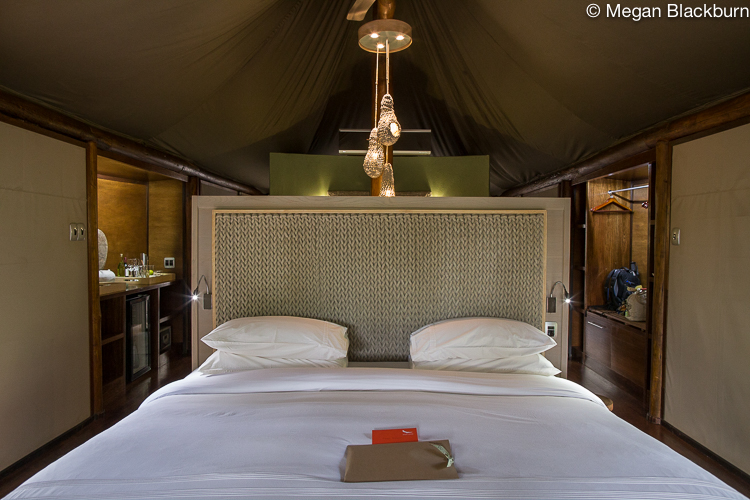
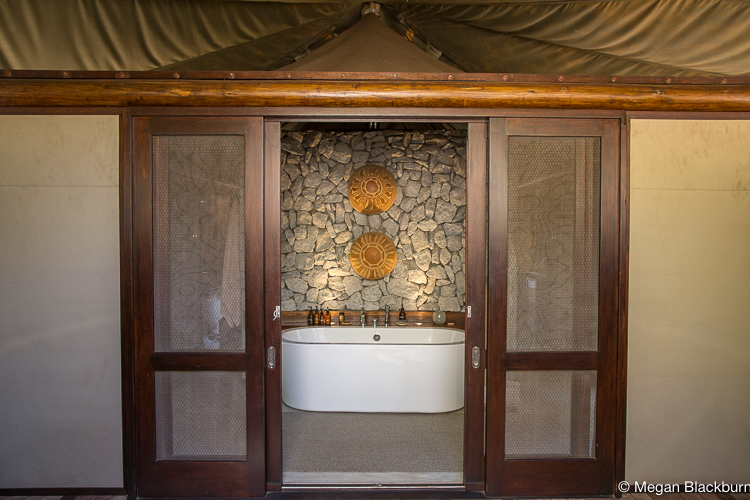
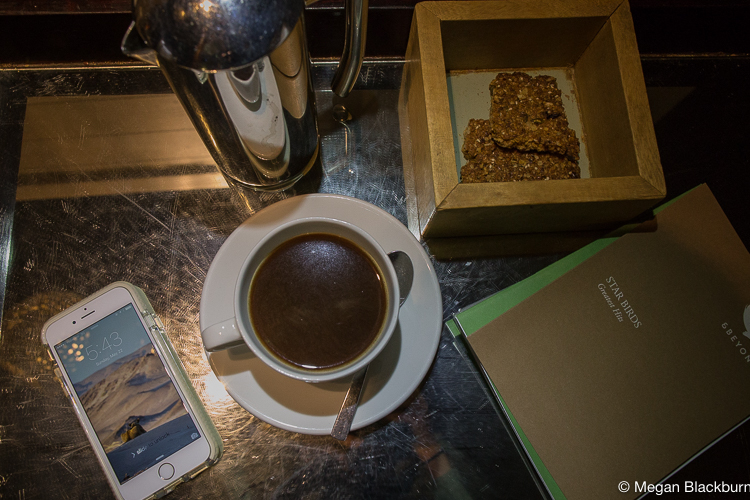
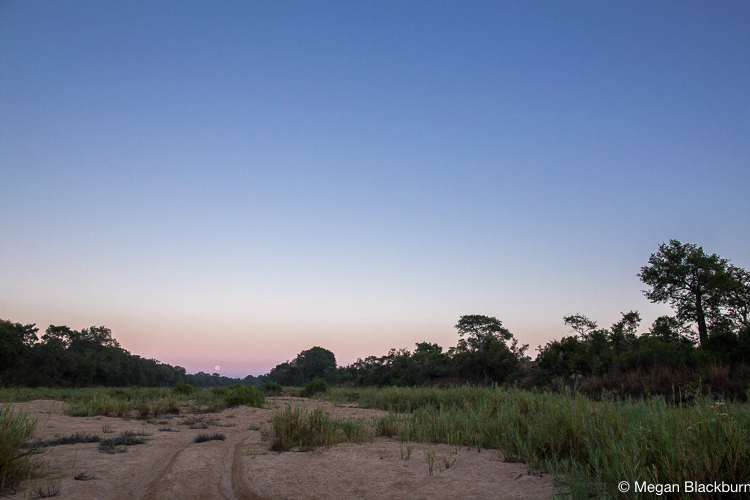
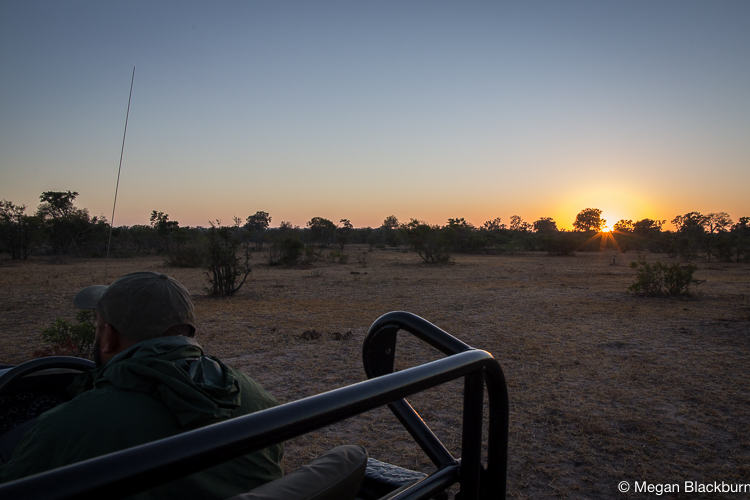
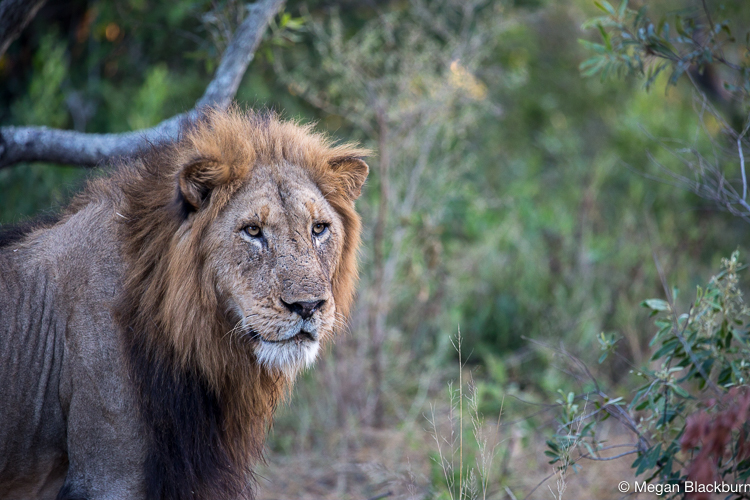
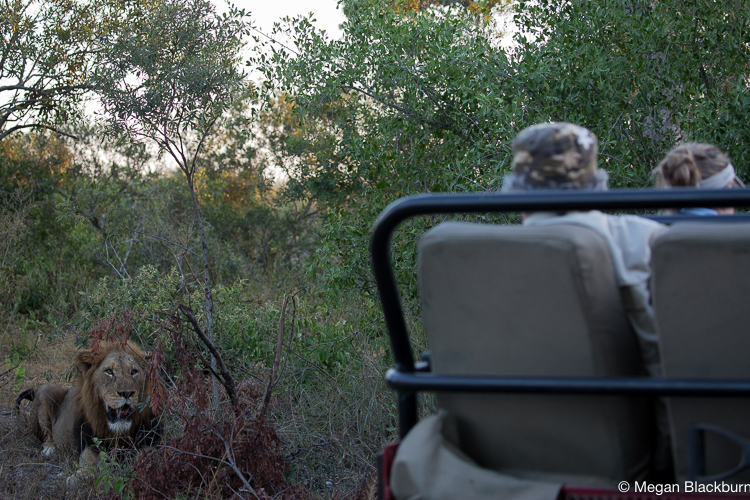
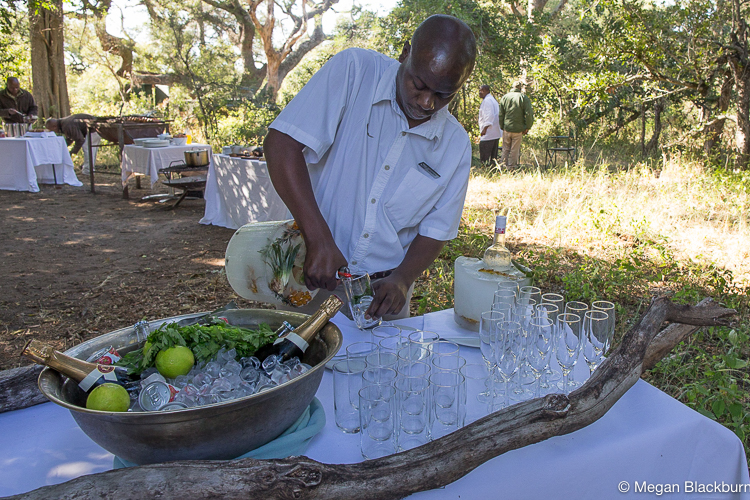
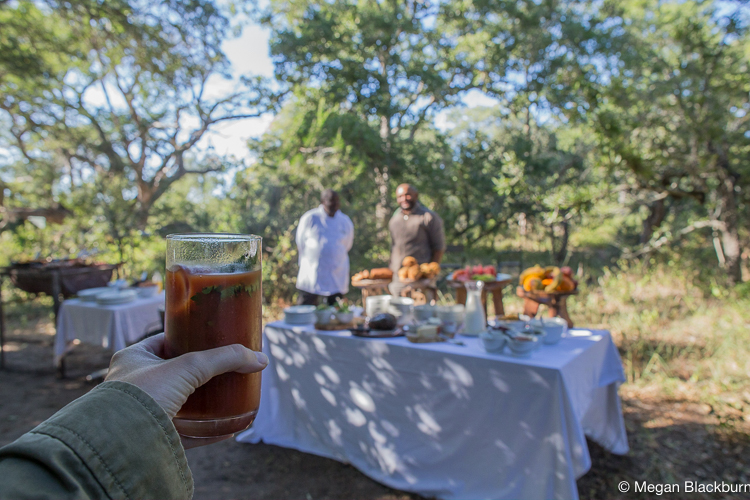
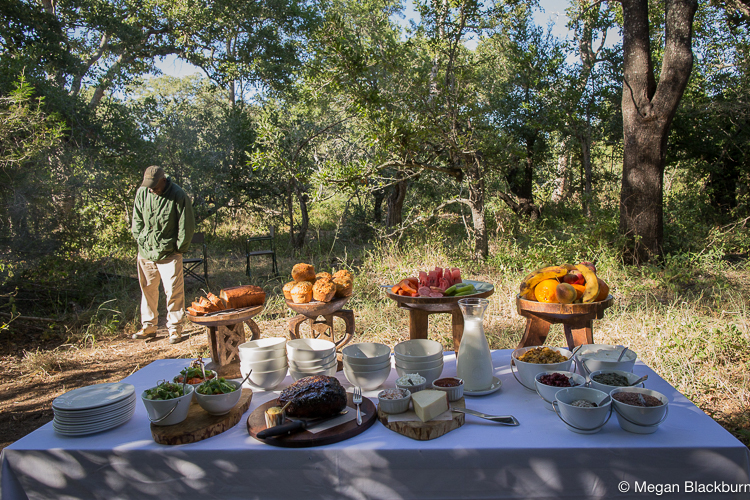
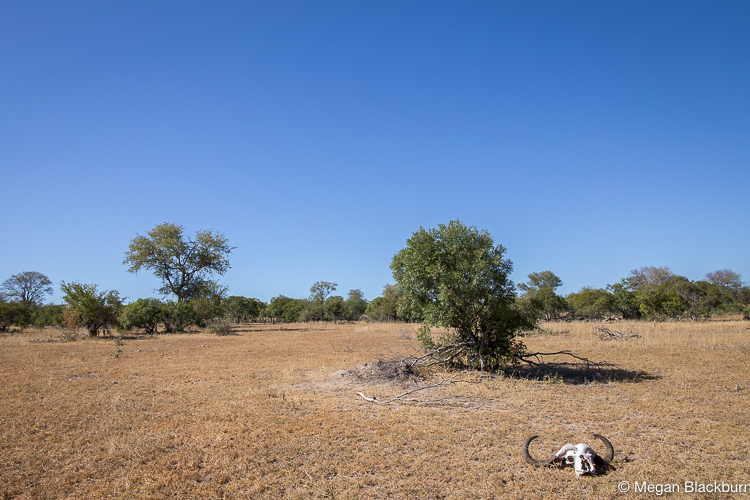
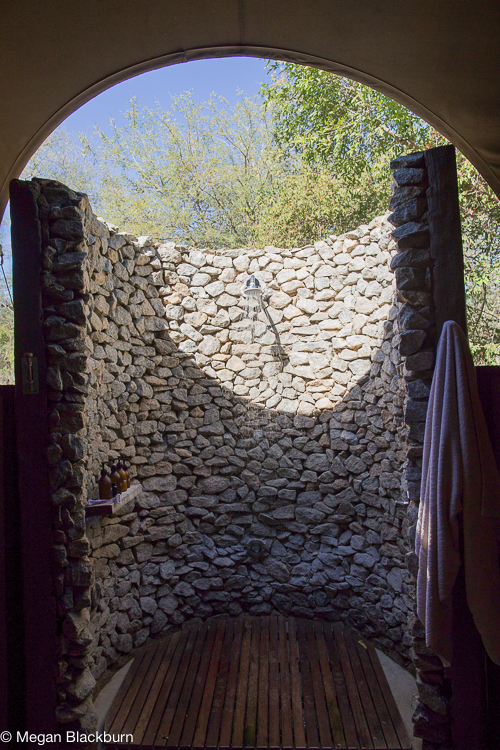
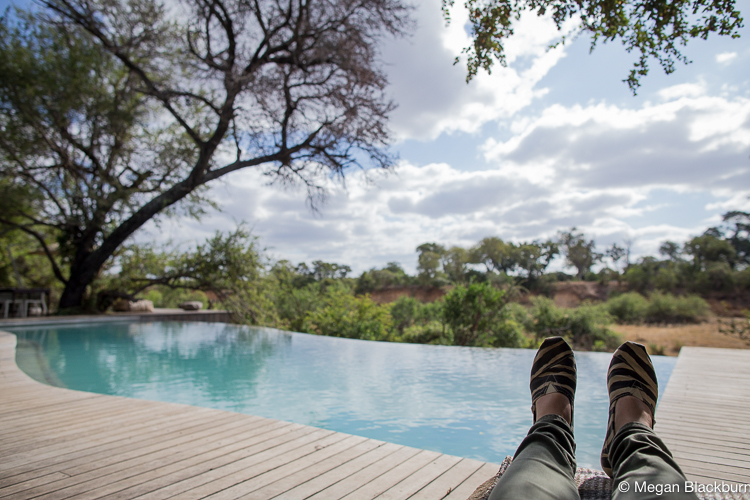
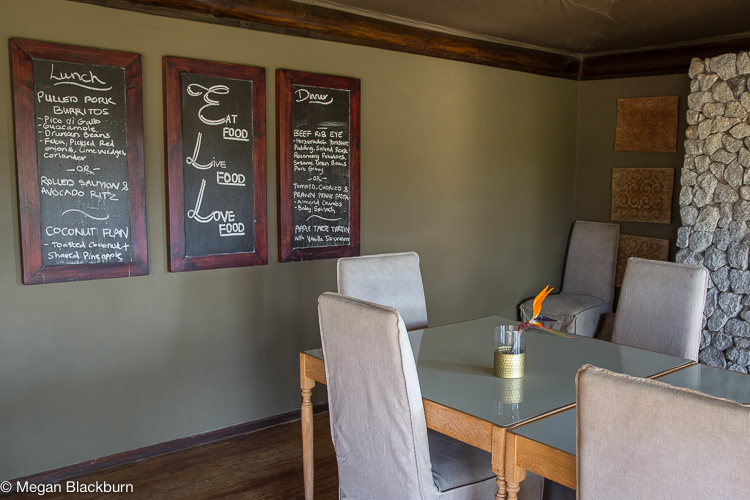
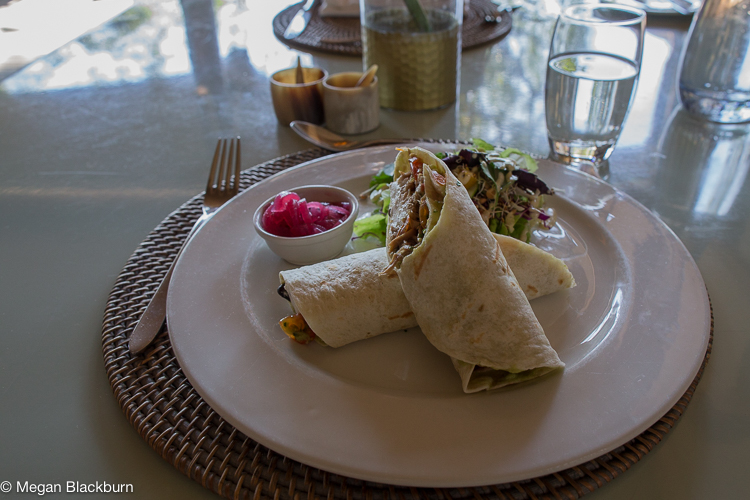
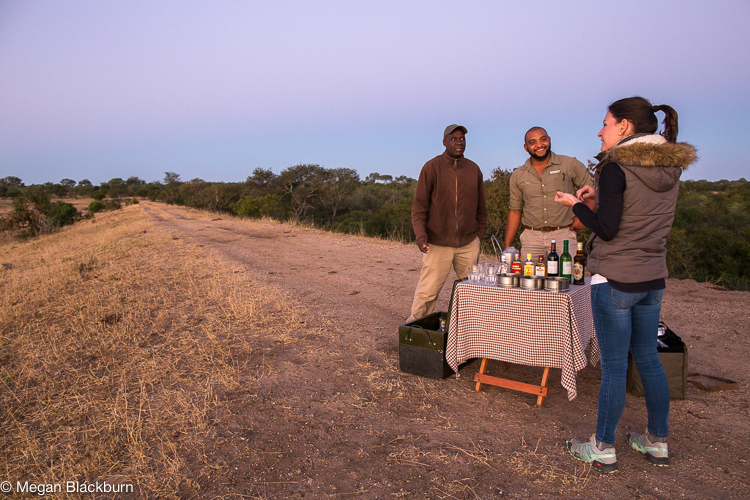
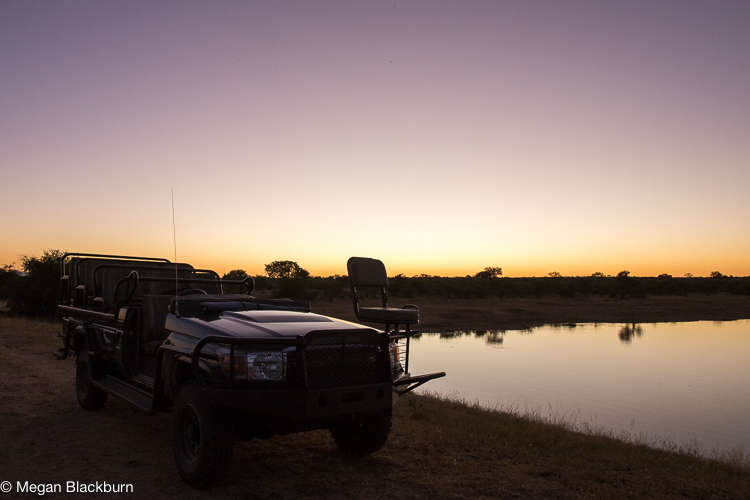



Megan, very good.. Thank you.
This makes me miss you – and safari! Already counting down to my next adventure in the bush!!